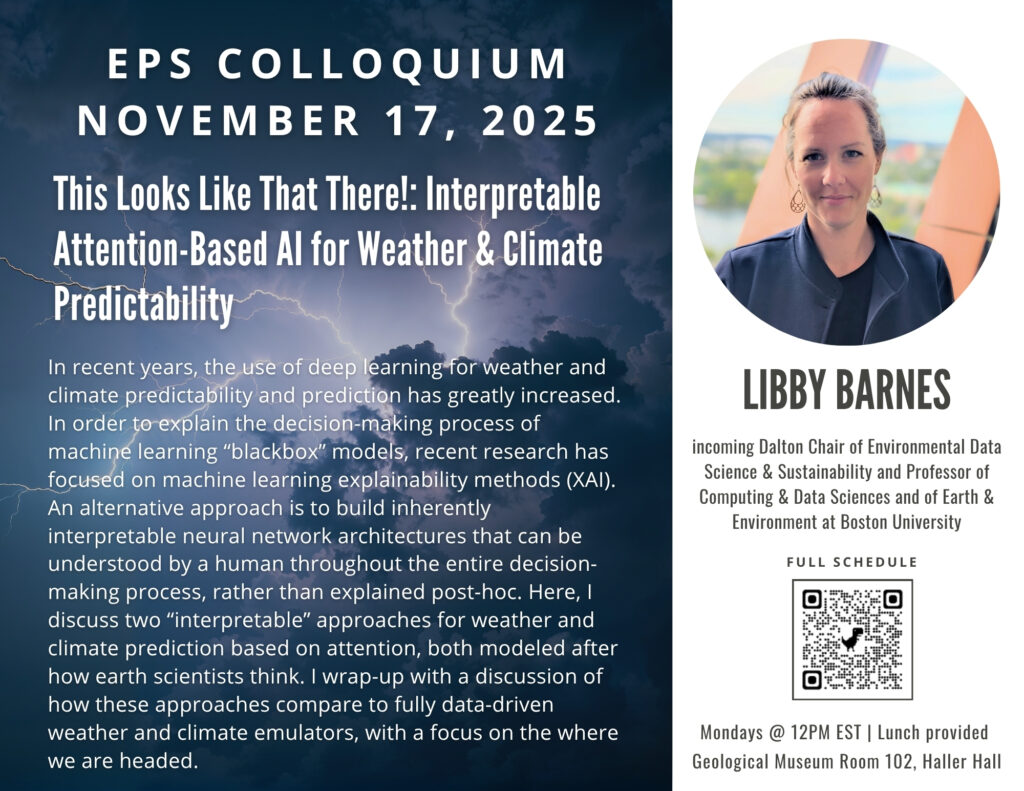EPS Colloquium – Libby Barnes, Boston University
This Looks Like That There!: Interpretable Attention-Based AI for Weather & Climate Predictability
In recent years, the use of deep learning for weather and climate predictability and prediction has greatly increased. In order to explain the decision-making process of machine learning “blackbox” models, recent research has focused on machine learning explainability methods (XAI). An alternative approach is to build inherently interpretable neural network architectures that can be understood by a human throughout the entire decision-making process, rather than explained post-hoc. Here, I discuss two “interpretable” approaches for weather and climate prediction based on attention, both modeled after how earth scientists think. I wrap-up with a discussion of how these approaches compare to fully data-driven weather and climate emulators, with a focus on the where we are headed.
To be added to the EPS colloquium mailing list, please contact Caroline Carr at carolinecarr@fas.harvard.edu

Dr. Elizabeth (Libby) Barnes is the incoming* Dalton Family Chair in Environmental Data Science & Sustainability and Professor of Computing & Data Sciences and of Earth & Environment at Boston University. Her group’s research focuses on understanding Earth system variability, predictability, and change across time and space, with an emphasis on developing and implementing artificial intelligence tools in a way that mimics scientific human reasoning to improve intrinsic interpretability. Her overarching research goal is to responsibly harness AI to anticipate human-Earth system futures in support of a thriving society in the decades ahead. She teaches graduate courses on statistical analysis, machine learning for the Earth sciences, and data-driven forecasting across timescales from days-to-decades.
Libby is a Fellow of both the American Geophysical Union (AGU) and the American Meteorological Society (AMS). She was awarded the Presidential Early Career Award for Scientists and Engineers (PECASE) by President Biden in January of 2025, and was the recipient of the American Geophysical Union (AGU) Macelwane Medal in 2021. She received the AGU Turco Lectureship for 2020, AMS Clarence Leroy Meisinger Award for 2020, and was awarded an NSF CAREER grant in 2018. She received the George T. Abell Outstanding Early-Career Faculty Award in 2016 and was recognized for her teaching and mentoring by being awarded an Honorable Mention for the Colorado State University Graduate Advising and Mentorship Award in 2017 and being named the Outstanding Professor of the Year Award in 2016 and 2022 by the graduate students of the Colorado State University Department of Atmospheric Science. In 2014 she was the recipient of an AGU James R. Holton Junior Scientist Award.
Libby is involved in a number of research community activities, including serving on the National Academies’ Board on Atmospheric Science and Climate and the NCAR Earth System Predictability Across Timescales External Advisory Board, and being and a funded member of the NSF AI Institute for Research on Trustworthy AI in Weather, Climate and Coastal Oceanography (AI2ES), among others.
Libby joined the BU faculty in 2025. Prior to coming to BU she was a Professor of Atmospheric Science at Colorado State University from 2013-2025. She earned dual B.S. degrees (Honors) in Physics and Mathematics from the University of Minnesota in 2007, and her Ph.D. in Atmospheric Science from the University of Washington in 2012. She also spent a year as a NOAA Climate & Global Change Fellow at the Lamont-Doherty Earth Observatory of Columbia University from 2012-2013.

